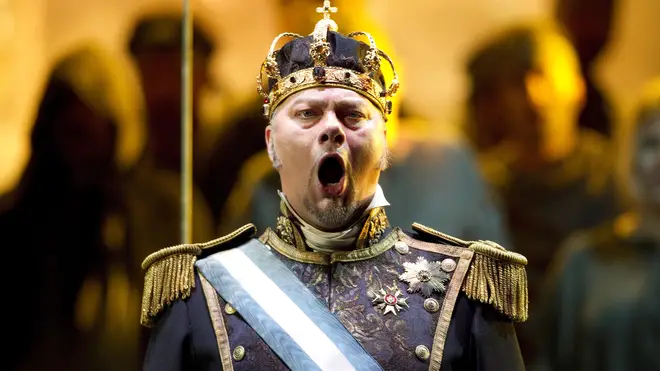On Air Now
Classic FM Breakfast with Dan Walker 6:30am - 9am
18 May 2018, 14:02 | Updated: 18 May 2018, 14:13

Our top picks for basses and baritones from more than three centuries of opera, oratorio and art song.
Unlike the stereotypical soprano heroine and the dashing tenor lead, the lowest male voice type is one of the most flexible in opera, used to represent the best and worst in human nature, from murderers to wise old men, from angels to the devil himself. But which songs show the bass voice off best?
We just had to kick off with Sarastro, the enlightened high priest in The Magic Flute, who holds the beautiful Pamina captive. His aria, ‘O Isis Und Osiris’ is one of the true tests of any operatic bass, and one of the artistic heights of the opera:

O Isis und Osiris - Franz Josef Selig
In an opera full of insanity and chaos, the bass role, Zoroastro, is the voice of reason. In this aria the wise magician tries to persuade the unstable hero Orlando to give up on his unrequited love for Angelica, return to war and fight for glory. The aria starts in a low register and climbs progressively, so that Zoroastro sounds both wise and trustworthy, and also increasingly passionate about the advice he gives to the young Orlando:

Gregory Reinhart "Lascia Amor" Orlando Handel
This comic showpiece is sung by the opera’s title character, Figaro the Barber of Seville, and it would challenge the vocal ability of any baritone (the voice type between tenor and bass). Full of tricky Italian superlatives and stretching the voice over a wide range, it is a holy grail of many high basses, and the repeated ‘Figaros’ before the final section have become a stereotype of operatic singing. If sung well it can be a real show-stopper:

The Barber of Seville - Figaro's Aria
'Erlkönig' is one of the most popular lieder in the repertoire, perhaps thanks to its gripping storyline and dramatic writing. Goethe’s ballad is characterised by a frequent use of direct speech, which was unusual for the poetic style and makes the tale even more vibrant.
A father rides through the forest carrying his son, who is delirious, perhaps due to illness. The son is terrified that they are being attacked by a supernatural creature, and the father desperately tries to reassure him as he rides. If you don’t know the piece, you’ll have to listen to it to find out what happens:

Ian Bostridge - Erlkönig
The harrowing conclusion to Mozart’s Don Giovanni must be one of the most dramatic moments in the opera repertoire. The bass voice here is used to represent divine justice, for better or for worse. The statue of the murdered Commander comes to life and tries to force the the womanising Don Giovanni to repent. When he will not, the statue grasps Don Giovanni’s hand in his iron grip and drags the man to hell:

Don Giovanni ; "Don Giovanni, a cenar teco"
This arioso recitative overshadows the aria which follows it, both in terms of musical interest and its resulting renown. This is because of its vivid musical descriptions of the creatures of the Earth, brought vividly to life by both singer and orchestra. Listen to how the writing changes to represent the lion, the tiger, the nimble stag, and the long slimy worm. (though watch out: the musical descriptions precede the singer’s introduction of each animal).

(VII) F.J. Haydn -〈The Creation〉Oratorio / Die Schöpfung, Oratorium (Christopher Hogwood)
Everyone loves a good villain, and they don’t get more villainous than Gounod’s devilish Mephistopheles from his best-loved opera, Faust. In his demure Act I duet, (Me Voici) Mephistopheles’ charm and wit thinly veils his violent and vicious nature, but all is revealed in Act II when he boasts of humanity’s vain worship of idols.
The richness of the bass voice is perfect for this dangerous and charismatic role, and leaves us in no doubt that the devil gets the best tunes!

Boris Christoff - Le veau d'or est toujours debout